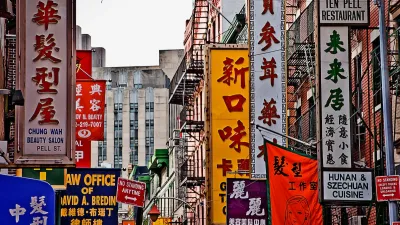‘Aging Out of Place’ explores the mechanisms that displace vulnerable seniors, and how the community can help preserve key resources and institutions.

A participatory art piece at the Data Through Design exhibit in Brooklyn uses the tile game mahjong “to explore what it means to grow old, isolated and increasingly invisible in a rapidly-gentrifying Chinatown – and to allow viewers to reimagine the neighborhood for the better.”
In an article for Next City, Eliana Perozo describes the project, titled “Aging Out of Place.” According to Perozo, “The title is a play on the research field of aging in place, or the ability to stay in one’s community and live independently with dignity, rather than being moved to a care facility or a senior home.”
Participants begin by reading a storytelling zine that provides context about the community, then moves on to playing a game with hand-painted tiles on a map of Chinatown. “Some of these are fixed, while others are movable, representing buildings that are vulnerable to gentrification – such as libraries, restaurants, community centers, churches and temples.” To play, “Players are encouraged to add or take away pieces – benches, libraries, elderly homes, soup kitchens and more — to envision a neighborhood where residents can age in place.”
The artist hopes the project will help show planners and policymakers how their decisions impact communities. “But she also hopes that it helps people think about how to protect their own cultural institutions and the vulnerable seniors in their own neighborhoods.”
FULL STORY: This Mahjong Game Shows How Gentrification Is ‘Aging Out’ Chinatown’s Seniors

Planetizen Federal Action Tracker
A weekly monitor of how Trump’s orders and actions are impacting planners and planning in America.

Map: Where Senate Republicans Want to Sell Your Public Lands
For public land advocates, the Senate Republicans’ proposal to sell millions of acres of public land in the West is “the biggest fight of their careers.”

Restaurant Patios Were a Pandemic Win — Why Were They so Hard to Keep?
Social distancing requirements and changes in travel patterns prompted cities to pilot new uses for street and sidewalk space. Then it got complicated.

California Homeless Arrests, Citations Spike After Ruling
An investigation reveals that anti-homeless actions increased up to 500% after Grants Pass v. Johnson — even in cities claiming no policy change.

Albuquerque Route 66 Motels Become Affordable Housing
A $4 million city fund is incentivizing developers to breathe new life into derelict midcentury motels.

DC Area County Eliminates Bus Fares
Montgomery County joins a growing trend of making transit free.
Urban Design for Planners 1: Software Tools
This six-course series explores essential urban design concepts using open source software and equips planners with the tools they need to participate fully in the urban design process.
Planning for Universal Design
Learn the tools for implementing Universal Design in planning regulations.
Heyer Gruel & Associates PA
JM Goldson LLC
Custer County Colorado
City of Camden Redevelopment Agency
City of Astoria
Transportation Research & Education Center (TREC) at Portland State University
Camden Redevelopment Agency
City of Claremont
Municipality of Princeton (NJ)





























